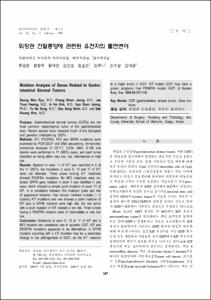위장관 간질종양에 관련된 유전자의 돌연변이
- Keimyung Author(s)
- Ryu, Seung Wan; Kim, In Ho; Sohn, Soo Sang; Kim, Dae Kwang; Kang, Yu Na
- Journal Title
- 대한외과학회지
- Issued Date
- 2005
- Volume
- 68
- Issue
- 2
- Abstract
- Purpose: Gastrointestinal stromal tumors (GISTs) are the most common mesenchymal tumor of the gastrointestinal tract. Recent studies have revealed much of the biological and genetics underpinning GISTs.
Methods: KIT, PDGFRA, NF2 and GPHN mutations were examined by PCR-SSCP and DNA sequencing. Immunohistochemical analyses of CD117, CD34, SMA, S-100 and desmin were performed in 11 GISTs cases, and each tumor classified as being either very low, low, intermediate or high risk.
Results: Mutation in exon 11 of KIT was identified in 6 of the 11 GISTs, but mutations in exon 9, 13 and 17 of KIT were not detected. Three cases lacking KIT mutations showed PDGFRA mutations. No NF2 mutations were detected. GPHN gene mutation in exon 1 was identified in one case, which showed a simple point mutation in exon 11 of KIT. In a correlation between the mutation types and risk of aggressive behavior, four tumors involved multiple (>2 codons) KIT mutations and one showed a point mutation of KIT plus a GPHN mutation were high risk, but one tumor with a point mutation of KIT showed a low risk. Three tumors having a PDGFRA mutation were of intermediate or very low risk.
Conclusion: Mutations at exon 9, 13 or 17 of KIT and a NF2 mutation are considered rare in sporadic GIST. KIT and PDGFRA mutations appeared to be alternatives. A GPHN mutation occurring with a KIT mutation may be a secondary change in the pathogenesis of GIST, as the KIT mutation is a major event in GIST. KIT mutant GIST may have a poorer prognosis than PDGFRA mutant GIST.
- Alternative Title
- Mutation Analysis of Genes Related to Gastrointestinal Stromal Tumors
- Publisher
- School of Medicine
- Citation
- 류승완 et al. (2005). 위장관 간질종양에 관련된 유전자의 돌연변이. 대한외과학회지, 68(2), 107–116.
- Type
- Article
- ISSN
- 1226-0053
- 파일 목록
-
-
Download
 oak-bbb-02978.pdf
기타 데이터 / 9.54 MB / Adobe PDF
oak-bbb-02978.pdf
기타 데이터 / 9.54 MB / Adobe PDF
-
Items in Repository are protected by copyright, with all rights reserved, unless otherwise indicated.